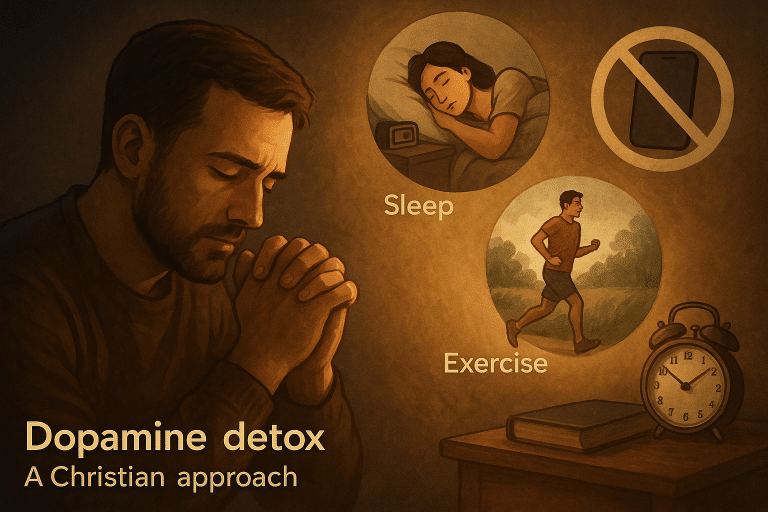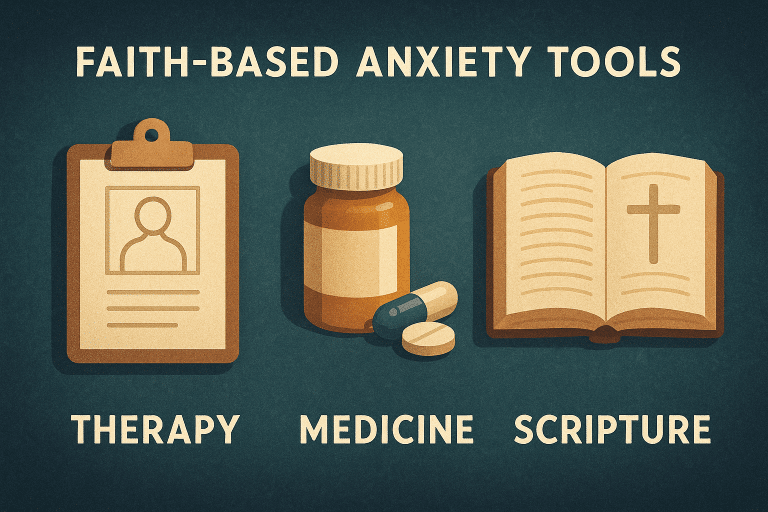Emotional Exhaustion Spiritual Renewal Practices: A Guide
Estimated reading time: 7 minutes
Introduction To Christian Burnout Recovery
When life piles on, even faithful Christians can feel wrung out. However, Scripture meets that reality with compassion and wise rhythms that restore joy. In plain terms, emotional exhaustion is the long, heavy drain that follows months of overextension. Moreover, it often includes brain fog, irritability, poor sleep, and dwindling motivation. Importantly, the Bible never shames weary people; instead, Jesus says, “Come to me… and I will give you rest” (Matthew 11:28–29). Therefore, this guide translates research-backed insight into everyday steps so you can practice emotional exhaustion spiritual renewal practices in a way that fits real life.
To ground our approach, we pair Christian discipleship with nervous system science. For instance, the Mayo Clinic Health System describes emotional exhaustion as feeling “worn out and drained,” with physical and mental symptoms. Additionally, the NAMI 2024 Workplace Mental Health Poll shows how widespread burnout has become. Consequently, believers need a framework that honors both body and soul. Accordingly, we will integrate biblical rest, community support, therapy, and carefully considered medicine as needed, because God often heals through ordinary means as well as prayer.
Finally, to keep this practical, each section ends with a simple action you can take today. As you walk through these steps, steadily reintroduce joy, margin, and purpose. In time, consistent emotional exhaustion spiritual renewal practices can stabilize your nervous system, clarify your thinking, and renew your relationship with Jesus.
Understanding Causes and Early Signals
First, understand what fuels the spiral. Typically, chronic demands activate the body’s threat systems for too long. Consequently, cortisol and adrenaline stay elevated, sleep suffers, and attention narrows. Over weeks, helpful stress hardens into depletion. In ministry, parenting, caregiving, and demanding jobs, people often push past limits because serving feels urgent. Nevertheless, even Elijah needed sleep, food, and gentle counsel before he could hear God again (1 Kings 19). Therefore, naming limits is not failure; it is faithful stewardship.
Second, watch for early signals. For example, you might feel “tired and wired,” snap at loved ones, or study Scripture yet retain nothing. Additionally, you may withdraw from friends, stop exercising, or lean on caffeine late in the day. When three or more of those signals persist for several weeks, you should pause and reset your routine. Practically, schedule a wellness visit to rule out anemia, thyroid imbalance, or sleep disorders, and then plan a recovery rhythm.
Action today: Write down three stressors you can reduce this month. Then, block a weekly Sabbath window on your calendar. To support that rhythm, read a short guide like How to Slow Down in a Fast‑Paced World and prepare one restful activity you will actually enjoy.

How Prayer and Physiology Work Together For Faith-Based Stress Relief
Surprisingly, prayer changes bodies as well as hearts. For instance, research summarized in Psychology Today notes that prayer can reduce stress and anxiety by engaging brain regions for calm attention. Likewise, slow, diaphragmatic breathing and biblical meditation increase parasympathetic (“rest and digest”) activity and downshift the fight‑or‑flight response. Moreover, gratitude practices measurably support mental and physical health, as Harvard Health Publishing explains. Therefore, when you read Psalm 23 slowly, sing with your church, or journal thanks to God, you also retrain your nervous system.
Biblically, God built rest into creation (Genesis 2:2–3) and commanded rhythms that limit constant toil (Exodus 20:8–11). Consequently, weekly Sabbath and brief daily pauses protect finite people from pretending to be infinite. In the Gospels, Jesus invites burdened people to take His easy yoke and learn His unforced rhythms of grace (Matthew 11:28–30). Additionally, Christian teachers emphasize that rest is an act of humility and trust, not laziness; see this concise overview from The Gospel Coalition Africa. Put simply, spiritual rhythms and evidence‑based practices complement one another.
Action today: Try a five‑minute breath prayer: inhale four counts on “Be still,” exhale eight counts on “and know that I am God” (Psalm 46:10). For a step‑by‑step tutorial, practice with Deep Breathing Exercises: A Christian Guide to Calm Anxiety or combine breathing and movement using Vagus Nerve Stimulation Techniques for Christian Peace.
Five Spiritual Renewal Practices That Work
1) Morning prayer in a quiet place. Start with 10 minutes. Importantly, keep it simple: speak your burdens, sit in silence, and end with the Lord’s Prayer. Furthermore, journal one sentence you sense God impressing on your heart. Because consistency matters more than intensity, choose the same chair and hour whenever possible.
2) Scripture meditation that renews thinking. Select one promise daily—Isaiah 40:28–31, Psalm 23, or 2 Corinthians 12:9. Then, repeat the verse three times, emphasize a different word each time, and ask, “What changes if this is true?” Consequently, negative loops weaken as truth takes root.
3) Weekly Sabbath that restores margin. Plan food ahead, put devices away, and practice delight: a nap, a walk, or a family meal. Moreover, thank God aloud for specific gifts. As you resist busyness, you embody emotional exhaustion spiritual renewal practices that honor your limits.
4) Fellowship and service inside healthy limits. Yes, community heals; however, overcommitment harms. Therefore, attend corporate worship, join a small group, and ask one trusted friend to pray with you weekly. Additionally, set two “no” boundaries that protect Sabbath and sleep.
5) Professional care without stigma. If despair persists, consult a licensed therapist and your primary‑care clinician. From a Christian perspective, using medication for depression or anxiety is a wisdom issue, not a moral failure (see The Gospel Coalition’s discussion). Consequently, short‑term medication may lower baseline symptoms so you can engage spiritual habits more fully.
Action today: Pick one practice above and place it on your calendar. For a relatable overview, read Feeling Overwhelmed and Distant from God, then text a friend to pray together this week.

Faith, Therapy, and Medicine—Working Together
Because God cares about whole people, wise believers combine prayer with sensible care. Therefore, begin with a medical checkup to rule out contributing conditions and to discuss options. Additionally, meet a Christian‑aligned counselor to address grief, trauma, and unhelpful thought patterns. Meanwhile, continue spiritual disciplines with your local church’s support. For balanced encouragement on sleep, exercise, and caffeine boundaries, see Anxiety Symptoms You Shouldn’t Ignore.
Moreover, practice gratitude and worship while you heal. Practically, gratitude journaling has measurable benefits, and worship reframes suffering in the presence of our Shepherd. Consequently, your outlook brightens even before circumstances change. Finally, remember that setbacks are normal; therefore, treat each day as another chance to walk with Jesus at a human pace.
Recommended Tools to Support Your Rhythm
These practical items can reduce friction and make new habits easier. Accordingly, every link goes to Amazon and includes our affiliate tag. As always, consult your clinician for personalized advice, especially if you have medical conditions.
- Study Bible (ESV or NIV). Deepen meditation with trustworthy notes. Explore options here: ESV Study Bible search or NIV Study Bible search.
- Guided Prayer & Gratitude Journal. Choose a simple, undated format to build consistency: gratitude journal options.
- Weighted Blanket (12–15 lb). Gentle pressure can encourage deeper sleep for many adults: weighted blanket picks.
- Noise‑Canceling Headphones. Create quiet for prayer, Scripture audio, and focused work: top headphone choices.
- Soft Sleep Mask. Darkness cues the brain for rest and protects Sabbath naps: sleep mask ideas.
Disclosure: If you purchase through these links, we may earn a small commission without cost to you. Nevertheless, we only recommend items that support sustainable, Christ‑centered rhythms.
Conclusion: A Gentle, Sustainable Path Forward
Ultimately, God renews strength as we wait on Him (Isaiah 40:31). Yet He also invites us to cooperate through wise habits. Therefore, start small, practice daily, and ask for help when you need it. Moreover, anchor your routine in worship and Sabbath, because those practices return your attention to the Shepherd who restores souls. As you apply these emotional exhaustion spiritual renewal practices, expect slow, steady gains—clearer thinking, deeper sleep, warmer relationships, and a revived love for Jesus.
For continuing support, explore cornerstone guides across this site: rebuild calm with Nervous System Basics, practice breath‑prayer with Deep Breathing Exercises, and end the night with Bible Verses for Anxiety and Sleeplessness. Additionally, the sources below provide balanced research and pastoral wisdom: Mayo Clinic Health System, TGC Africa on Rest, Harvard Health on Gratitude, and TGC on Medicine for Depression.






